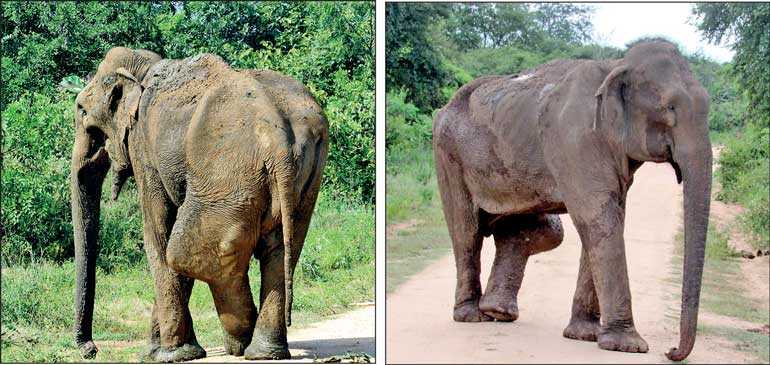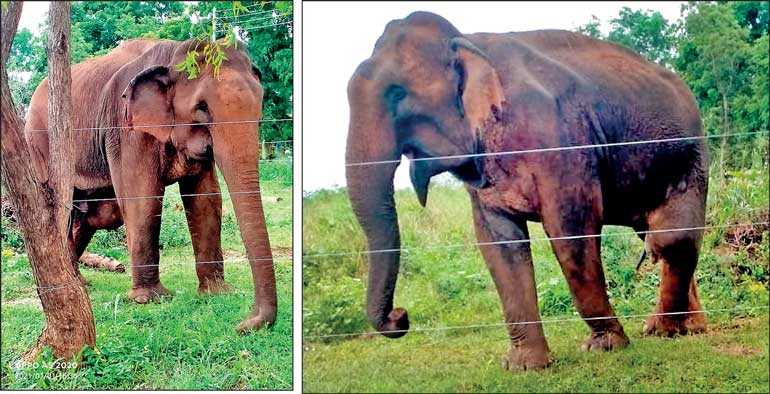Monday Feb 23, 2026
Monday Feb 23, 2026
Wednesday, 3 March 2021 00:00 - - {{hitsCtrl.values.hits}}

Bull elephant with gunshot injuries

By the fence on New Year's Day- Pic courtesy Madura Safari Uda Walawe
By Rohan Wijesinha
A new year spells new beginnings and brings with it the hope of things better. This year, it dawned very differently at the Uda Walawe National Park. The officers of the Department of Wildlife Conservation (DWC) were on a mission of mercy.
A large bull elephant had been shot; the bone and muscle of the knee of his back left leg had been shattered. It had swollen to many times its normal size, and needed urgent treatment. The shooting had taken place outside of the Park, and the DWC officers had to entice this beautiful creature back into it, with food and elephant delicacies, to keep him safe from more human torture, and to try and treat his wounds.
Despite the extent of his injuries, they managed to tempt him in, a considerable trek in his condition. In his prime, large and full of life, this big bull now faced the biggest challenge to his existence; to heal from human harm.
When death is a release
Six weeks later, and the DWC officers were trying to move him again, away from the edges of the Park, perhaps so that he could die in peace, away from the prying eyes of those who might otherwise exult in his sad ending.
Time, even this short span of time, had taken a heavy toll. Despite the every effort of the DWC officers, the swelling had now trebled in size, and was oozing with foul smelling suppurate. The once-proud beast, now an emaciated hulk, blind in one eye, perhaps the result of a previous bullet, shuffled along the road in obvious pain. His left back leg crumpled every time it took his weight, and with each step, more pus oozed out of the swollen mass of rotting flesh.
We may never know why he was shot, or why he deserved to be if such a justification can ever be made, but the placement of the bullet clearly showed that it was to hurt and not to instantly kill. Yet, with a political leadership seemingly intent on the decimation of the wildlife and wilderness areas of Sri Lanka, this will be just one of the many tragedies waiting to play out on lands that were once prized by our ancient rulers and peoples for their sanctity, serenity and life-giving powers, and were the foundation of this country’s prosperity.
Murdering the future
A government that wages war on its own people is referred to as a dictatorship but, usually, exists for just the lifespan of that particular rule as not even tyrants can live forever. History shows that power soon returns to the people, and sanity prevails once more.
Those who wage war on nature and the environment, however, are demons that are intent on destroying the futures of all who come after them. They have no comprehension of tomorrow but believe that their today is all that matters, a final generation.
Though the ‘future’ is bound to curse them for their callous destruction of it, they will no longer be there to suffer the consequences of their wickedness. Their children will be sent to live elsewhere, though as the climate heats up, due to deforestation and environmental destruction, there may be nowhere else to live.
Nature does not adhere to manmade boundaries – those constructed by states or individuals. A lack of water, polluted air and inadequate supplies of food will bring as slow and as lingering a death to humanity, as it is today coming to the dying bull elephant in the Uda Walawe National Park.
The Government has now determined that any farmer with over an acre of arable land is to be given guns to protect their crops from wildlife. It is estimated that there are approximately two million who will so qualify. Sri Lanka’s famous fauna, those exotic creatures with whom we share this island and who attract many visitors to our shores, will be the victims of this slaughter. The massacre will be apocalyptic. It will not only be elephants who will be targeted, but any creature that nears human cultivation and habitation.
There is also a matter of national security. In the last 50 years Sri Lanka has suffered the consequences of three major insurrections; two in the south and one in the north. There has been a rise in the levels of domestic violence. Will these guns be used against animals alone?
Give a child a gun, and who is responsible? It is clear as to who should be held to account for every human and animal death that results from this irresponsible political initiative. This is not being done for the benefit of farmers for if it was, the forests would be fiercely protected for they are the bringers of rain, and the precious water needed for agriculture.
Wild animals are an essential component of a healthy ecosystem. This is nothing but for the benefit of the policymakers and the money they, and their henchmen, can make from selling this precious natural heritage to large corporate entities who will rape it for what it can give them, and in the shortest possible time. Nothing but barren, waterless earth will remain for those who are left to try and scrape a pittance from the residue – the true farmers.
The final generation?
Historians, if there are any left, will refer to this as the Final Age as biodiversity disappears, and natural systems begin to collapse. There would be no point in appealing to our gods to sustain us as this destruction would have been orchestrated by men who delude themselves that they are divine and not just above the laws of men, but those of nature too. They, long ago, abandoned their worship of the just by building graven images of themselves with the materials they had plundered, and continue to steal, from the earth.
If only we could save it for the future, for the younger generations are far more aware of the value of Nature and the need to preserve it, intact, for the health and life of all? They are the hope of tomorrow. Are we going to stand by quietly and let them be robbed of their inheritance especially as there are so many ways for us to coexist with nature, and benefit from its blessings? Or do we, too, believe that ours is the final generation?
“Human kind of one generation holds the guardianship and conservation of the natural resources in trust for future generations…A sacred duty to be carried out with the highest level of accountability” – Justice Shiranee Thilakawardena (in Watte Gedara Wijebanda v Conservator General of Forests and Others 2009 1 SLR 337 at p. 338).